So, you’re at a point in your life where you’re unsure what direction to go in professionally. Should you work toward a promotion, change your career path, or even start your own business?
Knowing what you want in your professional life will help you take your next steps with intention and avoid making career moves that flop. You can clarify your direction by setting career development goals.
In this article, you’ll learn how to effectively set career development goals. Read on for a step-by-step guide and examples to help you get started.
What are career development goals?
Career development goals are specific objectives you set to advance your professional journey. They’re tailored to your career aspirations, ultimately helping you achieve what you want in your work life.
Why does setting career development goals matter?
A recent report found that the number one reason employees leave their jobs is a lack of career development. There’s no question that people want to grow professionally. But how can you make this happen? Let’s take a look.
Focus on the big picture
Knowing where you want to end up helps you align your daily actions and choices with your long-term vision. It’s easier to work hard when you know how your current tasks fit into your broader career aspirations.
With this mindset, you'll be far more likely to stay engaged in your career in the long run.
Make intentional decisions
Only 25% of employees are confident about their career paths at their current organization.
 |
How do you become part of this confident minority?
Setting career development goals will help you make informed choices that guide you toward your desired outcomes. Every decision, task, and role you take on is a step toward your ultimate goal.
Measure your progress (and success)
Having concrete goals allows you to track your progress over time and make adjustments to stay on course. They become your benchmark of success.
Regularly assessing your progress against these goals is a great motivator, as you’ll feel a sense of achievement seeing small victories bring you closer to your desired outcome.
Make sure you keep growing
As new challenges and opportunities come your way, you’ll need to adapt and evolve. Goal-setting helps you stay relevant in your field, capitalize on new opportunities, and avoid the trap of standing still.
The fear of being stuck in the same role with the same salary and mindset — once considered a hallmark of safety and stability — is no longer attractive to most people. Setting professional development goals reminds you to aim for the stars.
How to set effective career development goals
Here’s our five-step guide to setting professional development goals that resonate with your aspirations:
1. Shape your goals around what you define as “success”
What does success look like to you? Does it mean getting paid a certain salary, reaching a particular position, or simply maintaining a good work-life balance?
Consider your values, interests, and lifestyle to determine what it means to be not only successful but also content in your professional life. And let those answers shape your goals.
2. Outline your short- and long-term goals
Professional development goals can get overwhelming because they are often considered too big or too far away. Breaking down your career aspirations into short- and long-term objectives allows you to better manage and measure your progress.
You can start with long-term goals and work your way backward along your timeline to set medium-term goals, which are goals you can achieve in one to five years. Break these down even further into the most immediate, actionable steps.
It also helps to see your goals on a visual timeline, as this solidifies your commitment to them. With Motion, you can set and visualize your immediate and future milestones to stay motivated.
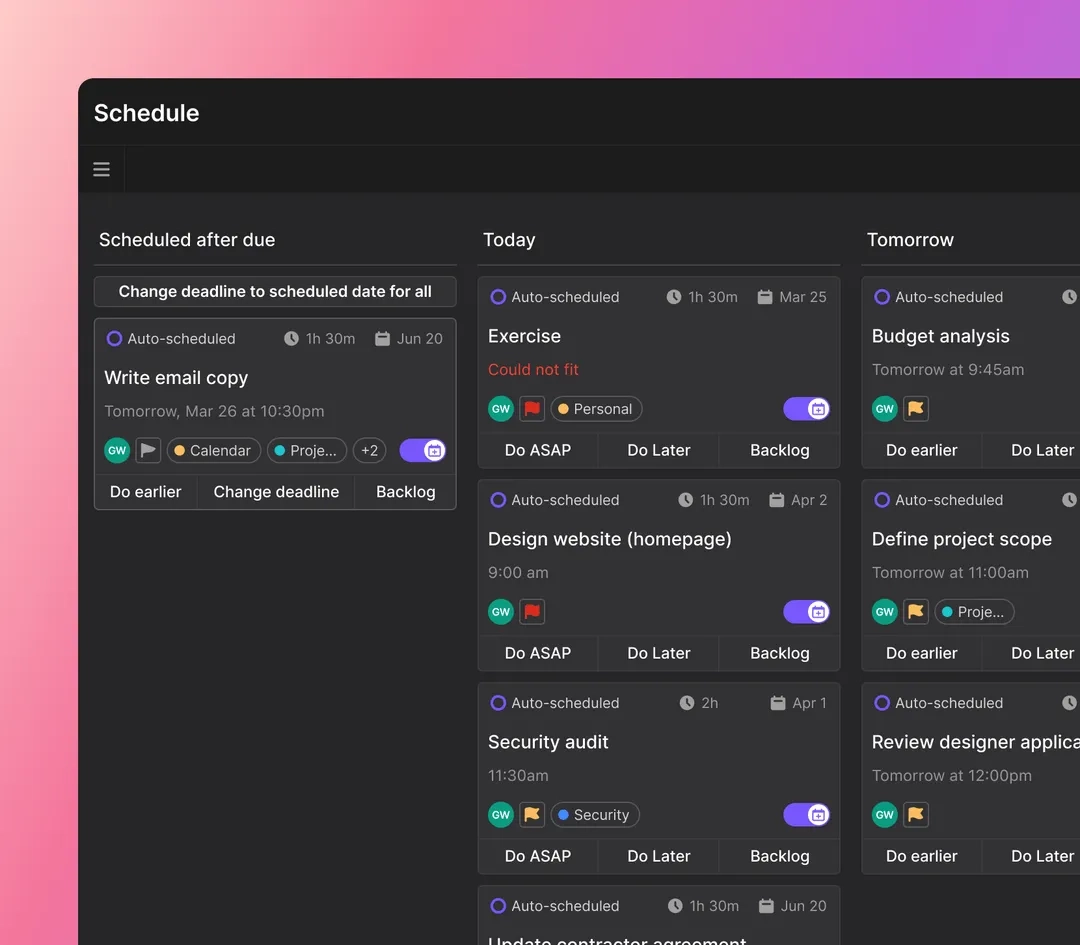 |
3. Map out how you’ll achieve each milestone
Now that you've determined your goals, it's time to create a detailed action plan for each one. To do this, clarify any necessary steps, resources, and timelines.
Coming up with a game plan turns your visions into actionable steps, making your goals more attainable and less intimidating.
With Motion's Task Manager, you can plan your strategy, break it down into specific tasks, and assign deadlines to each one. We’ll even send you deadline alerts to keep you on track and ensure you never miss a step.
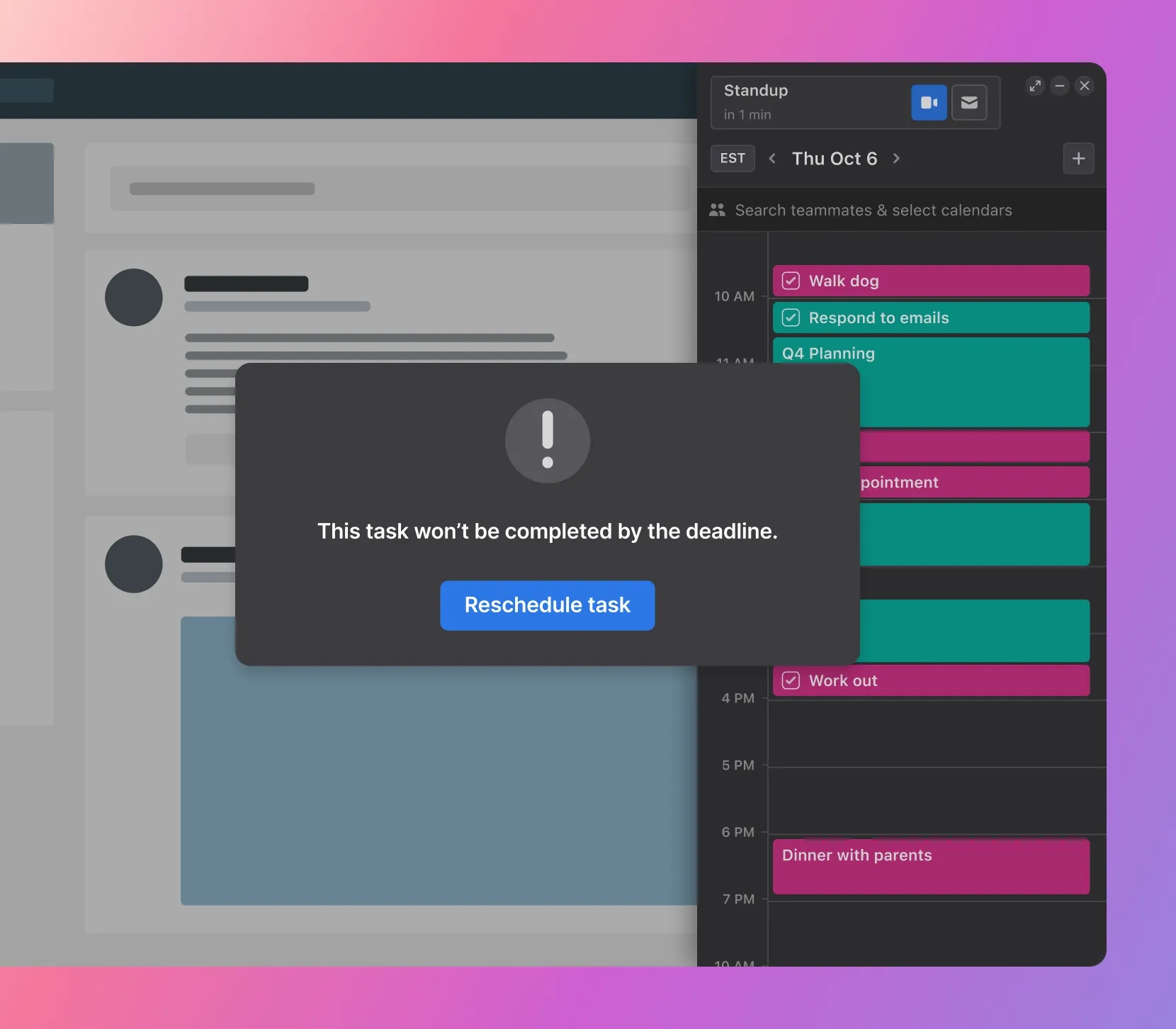 |
4. Track your progress along the way
But goal-setting doesn’t end there. You still need to regularly review and assess your progress against your goals. Why? To stay aligned with your objectives and pivot if something changes. Continuous self-evaluation keeps you moving in the right direction.
Motion’s progress tracker makes it easy to monitor your accomplishments and hold yourself accountable. Stay focused and committed throughout your career development journey.
5. Adjust your goals if need be
Your goals should never be set in stone; there needs to be room for adjustment in case your aspirations or priorities shift. Whether it’s because of new insights, unexpected opportunities, or a change in outlook, your goals should be updated accordingly.
Staying flexible is key here, and Motion helps you do just that. We’ll automatically reschedule your day and tasks when interruptions or unexpected events happen, making sure you can adapt without losing momentum.
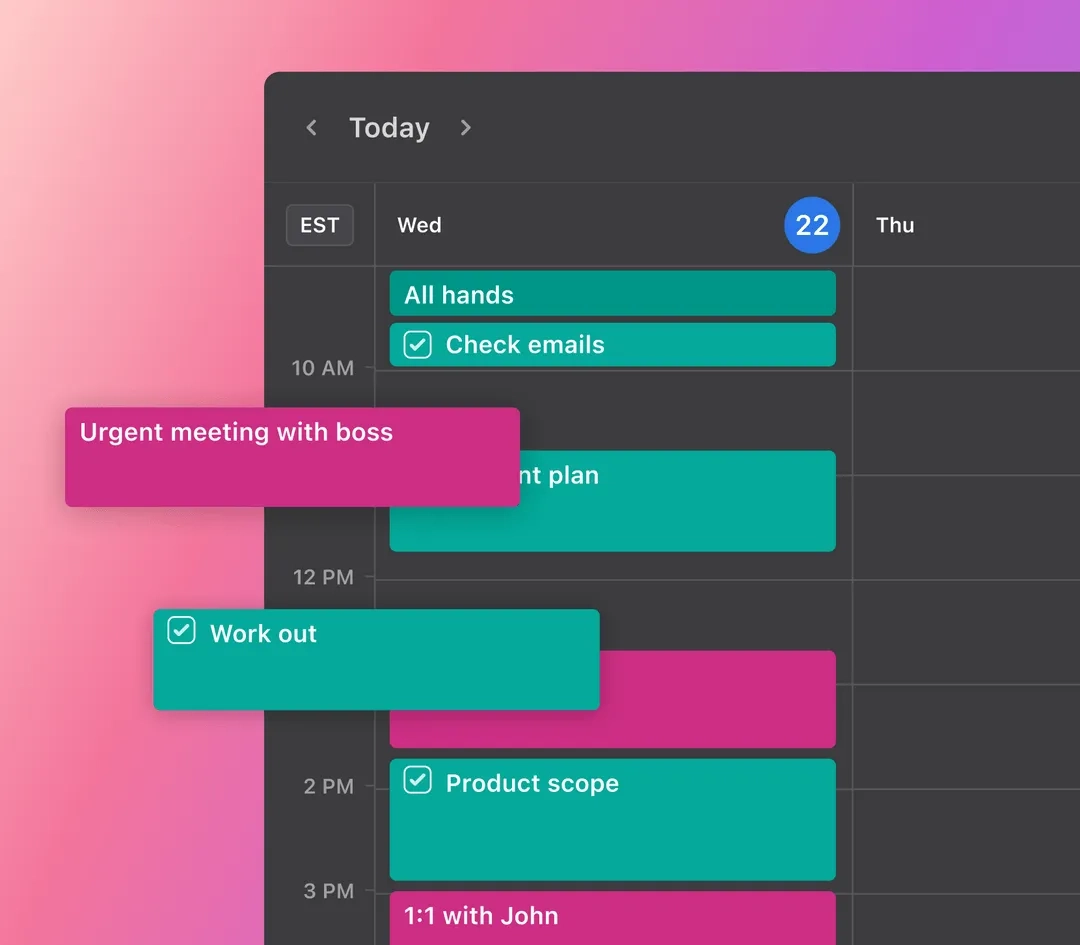 |
12 examples of career development goals
Here are 12 examples of career development goals to inspire, guide, and shape your professional journey:
1. Learn a specific skill or technology
Whether voluntarily or out of necessity, many reconsidered their career paths and took the opportunity to learn new things during the COVID-19 pandemic. Even now, 94% of employees believe it’s more or equally important than pre-pandemic to develop skills outside their current roles.
Learning a specific skill helps you stay competitive in your field and prepares you for unexpected changes. It also boosts your confidence because you know you have something valuable to offer.
A good place to start is by observing and researching what’s in demand in your industry trends. Look at job postings and industry news, and consider where your sector is headed in the next few years.
Life and work can get overwhelming fast, and the last thing you want is for skill development to take up all your free time. That’s why it’s important to set aside regular, dedicated time slots for focused learning. Motion helps you organize your schedule and time block periods for deep learning and research without sacrificing your work-life balance.
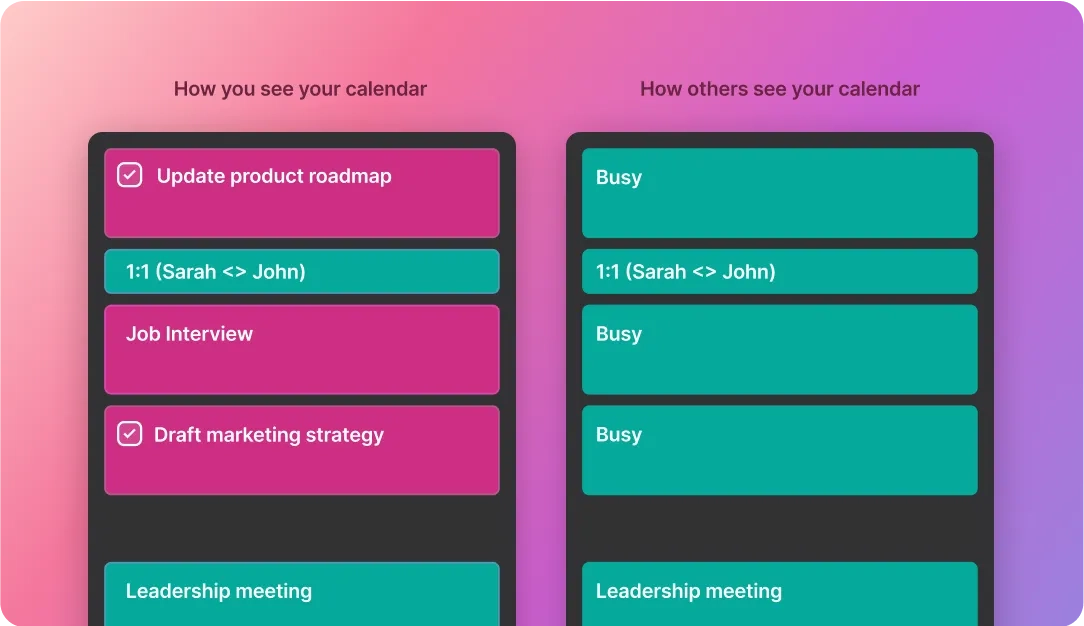 |
2. Earn an X amount of salary
Many people set this goal as a success marker, and rightfully so. Getting paid a specific salary can mean financial security for yourself and your loved ones, as well as the ability to live the lifestyle you want.
Research industry standards to set realistic salary goals for yourself. And if the salary trajectory doesn’t match your expectations, maybe it’s time to consider a new move.
Then, based on that research, list the relevant actionable steps you need to take and the qualifications required to reach that target salary. This might come in the form of education, certifications, or networking.
3. Expand your network
Self-made billionaire Ray Dalio famously said, “Getting the right people in the right roles in support of your goal is the key to succeeding at whatever you choose to accomplish.”
Building your network opens up different opportunities for learning, collaboration, and advancement. A supportive network of mentors and peers is a well of resources that can help you throughout your professional journey.
Expand your social circle by joining industry conferences, online webinars, or local community groups.
Keep in mind, too, that networking doesn’t even have to be industry-related — different connections can provide new perspectives and opportunities and inspire you to work differently.
 |
4. Find or become a mentor
When you were a newbie in your field, did you wish you had more guidance and direction? Mentors can help bridge the gap between where you are and where you want to be. Specifically, they provide support, wisdom, and insights to help you navigate challenges and accelerate your career growth.
Over time, your personal goal can change from finding a mentor to becoming one for someone else.
It’s a great idea to join mentorship programs in your industry to connect with potential mentors and mentees. You can also offer your expertise at industry events or online forums to establish yourself as a resource and further expand your network.
5. Transition into a leadership role
Becoming a leader in your company or industry signifies clear career progression and gives you a chance to hugely impact others’ direction and success.
Before setting your sights on a leadership position, think about what skills or qualities you need to reach it. Asking for feedback and coaching on leadership skills is good practice for improving your leadership ability and identifying areas for improvement.
However, don't set this as your goal just because it seems like the expected next step. Remember to ask yourself if this is what you really want and if you’re prepared to take on the responsibilities that come with a leadership position.
6. Achieve better work-life balance
Much of the younger workforce defines having a life outside work as success. In fact, the top trait that Gen Zs and millennials admire in their peers is the ability to have a work-life balance.
To achieve this goal, you’ll need to set clear boundaries between work and personal time. Learning to prioritize tasks and delegate work when necessary is crucial to ensure you’re not overwhelmed and can truly disconnect when away from work.
Or, let Motion delegate tasks for you so you can focus on what’s important in both your career and your personal life.
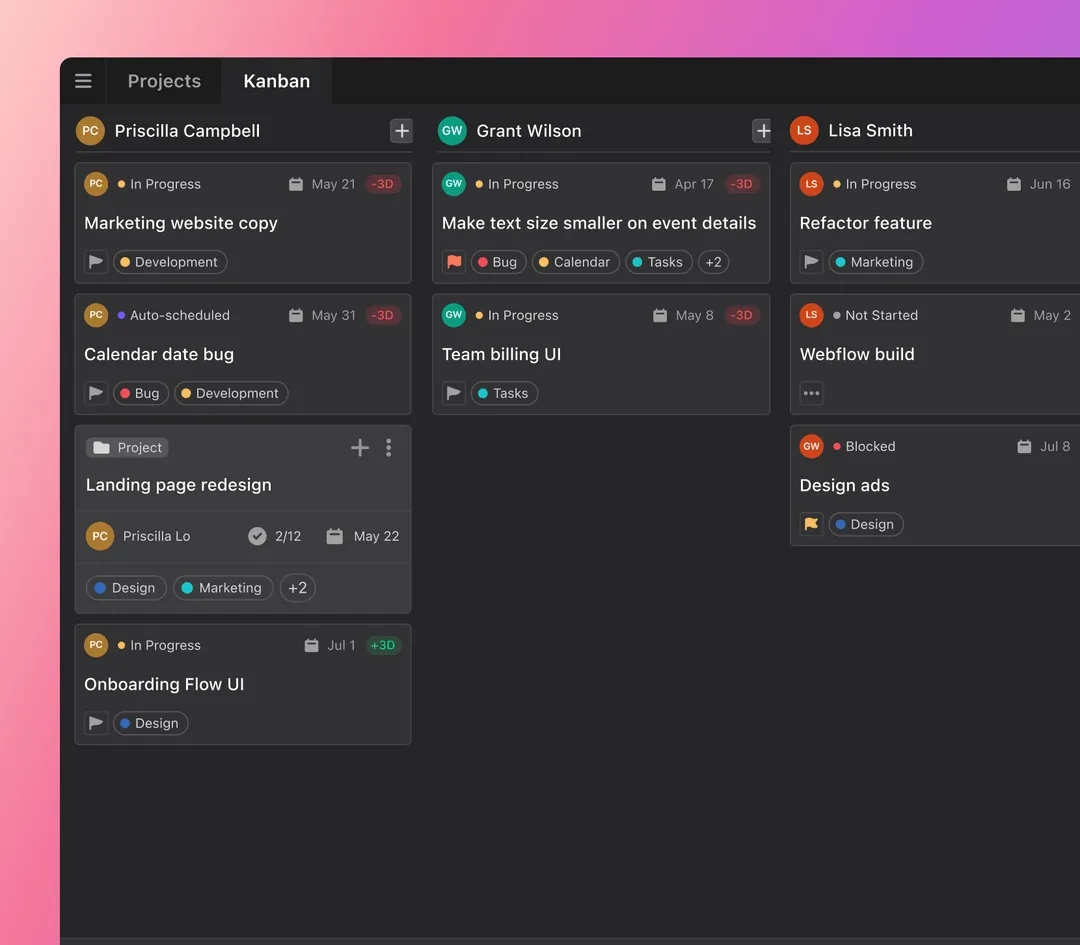 |
7. Feel satisfied at work
When we think about success at work, satisfaction is often an overlooked goal. Yet, it's fundamental because a sense of fulfillment in what we do can impact our performance.
Ask yourself what you find to be the most rewarding or brings you the most happiness at your job. Is it collaborating with others or solving problems, for instance? Seek out projects or roles based on those answers. Make sure what you do aligns with what fulfills you to ensure you have a long-lasting and fulfilling career.
8. Pursue a passion project
Not everyone has to love their job, but those who do are often more motivated and engaged in it. While careers don’t have to align with passions, pursuing a passion project, like a professional side venture, can inject new energy into your life and offer a refreshing counterbalance to your routine job.
Allocate a specific amount of time each week to work on your passion project for consistent progress. Plus, connect with others who share your passion to expand your project's reach and open up further opportunities for growth.
9. Be able to work from anywhere
Remote work has surged in popularity thanks to the flexibility and independence it offers, with 82% of workers saying they enjoy working remotely. This makes being able to work from anywhere another popular career development goal.
But to succeed as a remote worker, you need to develop both hard and soft skills, such as self-discipline, technological proficiency, and time management.
Motion can help you better manage your time by prioritizing tasks based on their deadlines and importance. Know exactly what you need to do next to reach your goals.
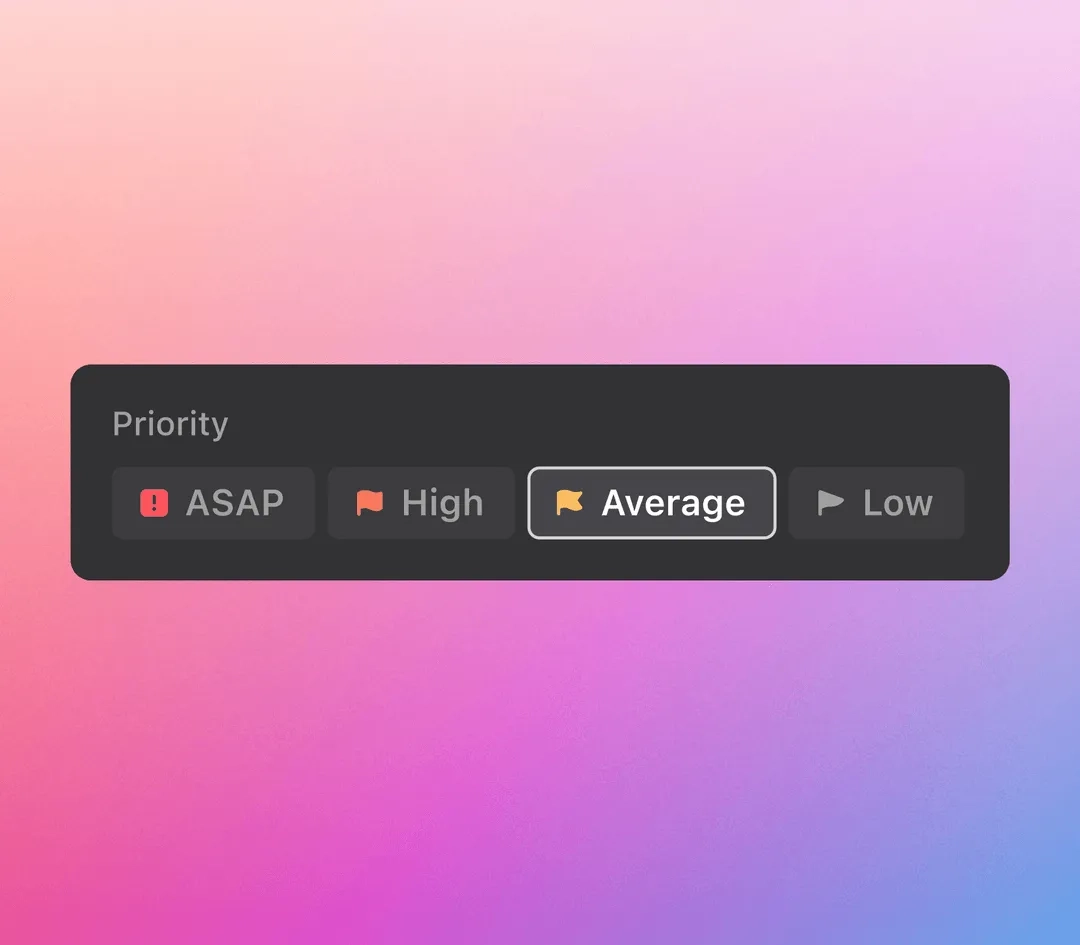 |
10. Shift into a new career path
For those who see their current job as a stepping stone or want to explore a new industry, a good career development goal is to change career paths. This transition can be a big step, offering fresh challenges, new learning opportunities, and the chance to engage with work in a more meaningful way.
If you’re unsure what direction to take, research other industries to see which one aligns with your interests, values, and skills. Or, if you already have an idea, interview those who already work in the industry to get an honest look into what to expect and how best to prepare to make the leap.
11. Retire by a certain age
“When do I plan to retire?” is a good question to ask yourself when you’re setting career development goals. Your answer will guide your plan, influencing your decisions on savings, investments, and career moves.
Take a look at different retirement lifestyles to understand the financial requirements needed to sustain each. Then, set financial milestones to help you track your progress and stay motivated on your way to your retirement goals.
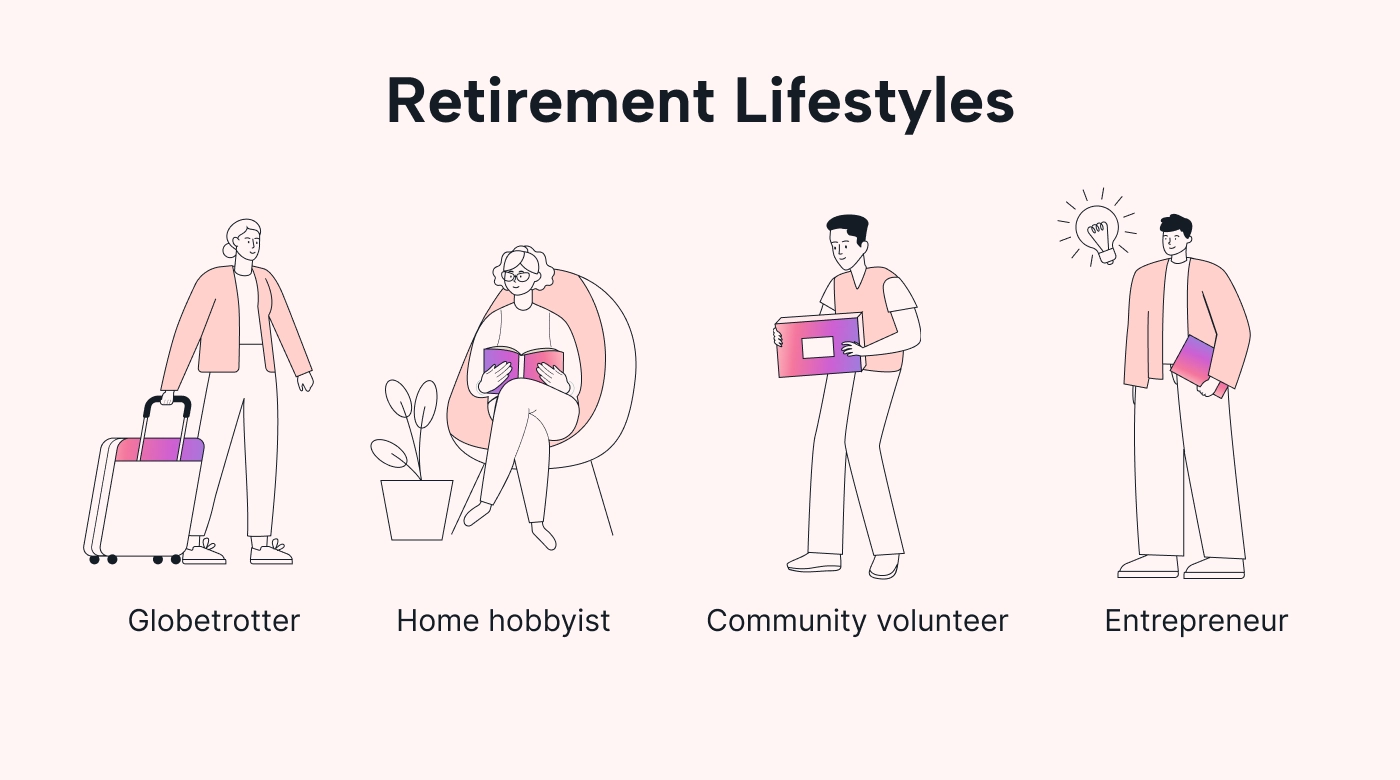 |
12. Make an impact
Making an impact can mean something different to everyone, be it pioneering solutions at work, launching initiatives to help your community, or even solving worldwide problems.
While this goal can seem ambitious, you can start small. Volunteer for leadership roles in projects or committees to influence change. Over time, you'll build the skills and connections you need to expand your impact and reach.
Reach your career goals with Motion
Set your sights high and let Motion help you pursue — and meet — your career aspirations. Start planning your professional journey with us today.

Vicki Chen is a content writer and marketer using proven storytelling methods to create high-quality copy and content for SaaS companies. When she's not writing, she's spending time with Taco, her rescue dog.




